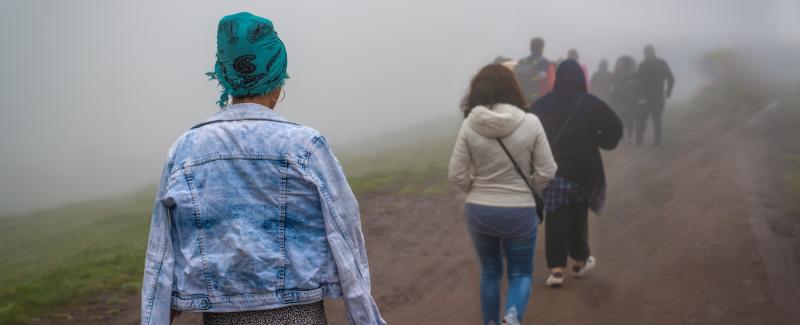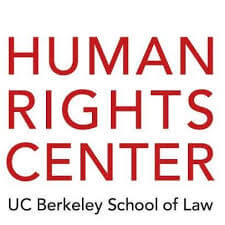Disaster and Displacement: Inequalities in Climate Migration

This event is part of CEGA’s 2020 Evidence to Action (E2A) Series, which showcases research on climate change, the environment, and global poverty. The event is co-hosted with the Berkeley Interdisciplinary Migration Initiative, and the Human Rights Center as part of UC Berkeley’s Social Science Matrix “Matrix on Point” series.
Within the next 30 years, slow-onset climate change may impel as many as 143 million people living in the Global South to relocate within their countries of origin. Longer-range forecasts predict that by 2070 rising temperatures may render one-fifth of the earth’s landmasses uninhabitable, forcing international migration on a massive scale. Among the displaced, low-income populations will be particularly vulnerable, and cities in the Global North may have to absorb and provide services for these immigrants. Given the politicization of migration in recent years, and the lack of international policies to protect climate refugees, climate change is anticipated to reinforce global inequalities.
This Matrix On Point not only will address the dynamically interconnected humanitarian, ecological, and geopolitical impacts of climate migration, but will also propose forward-looking and compassionate policies that can help mitigate displacement, address global inequalities, and support refugees forced to leave their homelands due to extreme weather, devastated ecosystems, and other climate-related issues.
Other events in CEGA’s E2A series include Evidence to Action 2020: Climate Change and the Global South (Nov 16th), and Infra4Dev: Decarbonizing Infrastructure (Nov 18th, with the World Bank).
Panelists
Kanta Kumari Rigaud is a Lead Environmental Specialist at the World Bank with more than 25 years of professional experience in natural resources management, environmental management, and climate change adaptation. She is the lead author of the Bank’s flagship report, Groundswell – Preparing for Internal Climate Migration, working with a multidisciplinary team from leading institutions to provide insights on the plausible scale of climate induced migration. She also co-led the Bank’s engagement with the Potsdam Institute of Climate Impact Research to develop the Turn Down the Heat flagship report series, which focuses on the nexus of climate science and development. Currently, she is leading the Bank’s work on the Next Generation Africa Climate Business Plan and analysis of climate induced migration in West and East Africa. She serves as co-chair of the Technical Working Group on Environmental Change and Migration of KNOMAD, the Global Knowledge Partnership on Migration and Development. She has a Ph.D. from the University of East Anglia in the United Kingdom.
Daniel Kammen is a Professor of Energy at the University of California, Berkeley, with parallel appointments in the Energy and Resources Group where he serves as Chair; the Goldman School of Public Policy, where he directs the Center for Environmental Policy; and the Department of Nuclear Engineering. Dr. Kammen is the founding director of the Renewable and Appropriate Energy Laboratory. He has served as a contributing or coordinating lead author on various reports of the Intergovernmental Panel on Climate Change since 1999. The IPCC shared the 2007 Nobel Peace Prize. In 2010, he was appointed by Secretary of State Hilary Clinton to serve as the first Energy and Climate Partners Fellow to the Americas, and in 2016, he began service for Secretary of State John Kerry as Science Envoy in the State Department. He resigned in 2017 over the Trump Administration actions on climate, justice, and hate-groups.
Lori Hunter is Professor of Sociology and Faculty Research Associate in the University of Colorado Institute of Behavioral Science’s Research Programs on Environment & Society, as well as Population. She is Associate Director of the CU Population Center, which facilitates research on three signature themes: migration, health, and population-environment interactions. Dr. Hunter is Editor-in-Chief of the academic journal Population and Environment, chair of a Special Emphasis Panel on Migration, Climate and Health for the International Union for the Scientific Study of Population (IUSSP), and past Chair of the Steering Committee of the Population-Environment Research Network (PERN).
Elizabeth Fussell, Associate Professor of Population Studies and Environmental Studies at Brown University, is a sociologist and demographer whose research focuses on environmental dimensions of population change and migration. She is Editor-in-Chief of the Springer journal Population & Environment. Fussell’s current research focuses on the long-term effects of Hurricane Katrina on New Orleans residents. Other research on New Orleans after Hurricane Katrina has focused on the arrival and reception of the Latino immigrants who participated in rebuilding the city, the impact of displacement on the health of low-income mothers, and differentials in the return migration of displaced residents. A new project investigates the effects of economic and environmental shocks on population change in Puerto Rico. Her research has been funded by the National Institute of Child Health and Development, the National Science Foundation, and the Russell Sage Foundation and published in journals such as Demography, Nature Reviews Earth and Environment, Social Science and Medicine, Social Forces, and others.
Teevrat Garg, CEGA Affiliated Professor and Assistant Professor at UC San Diego works on a variety of economic issues with a focus on applications to environmental problems in low- and middle-income countries. His current research projects include uncovering causal mechanisms that link ecosystem health to human health and the distributional consequences of adaptation to climate change.
Irene Bloemraad (moderator) is Professor of Sociology and the Thomas Garden Barnes Chair of Canadian Studies at Berkeley. She is also the founding Director of the Berkeley Interdisciplinary Migration Initiative, and holds the position of Senior Fellow with the Canadian Institute for Advanced Research. In 2014-15, she served as a member of the U.S. National Academies of Sciences committee reporting on the integration of immigrants into American society. Her research stands at the intersection of immigration studies and political sociology, with a strong interdisciplinary (and international) scope.




